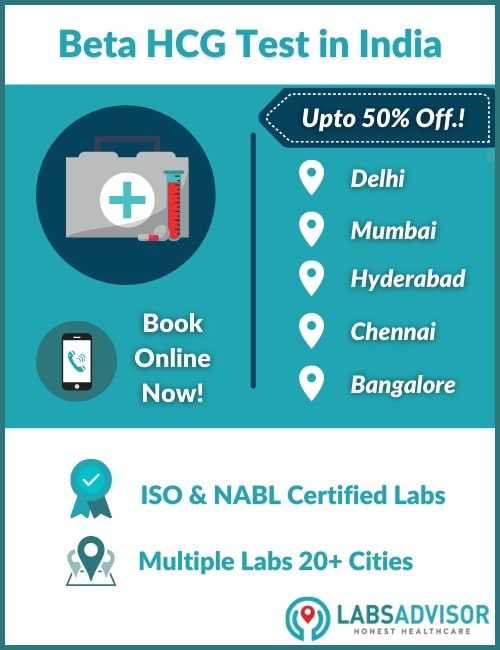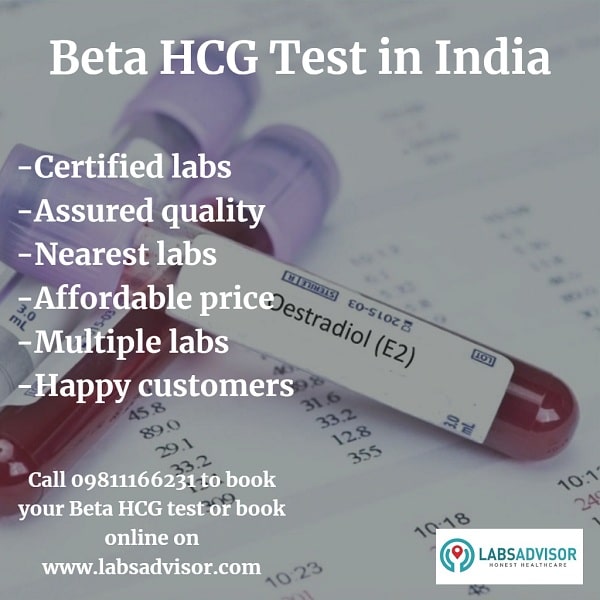
Beta HCG test / Beta Human Chorionic Gonadotropin test is a type of pregnancy test. The Beta HCG test is a blood test to measure the level of HCG hormone in a sample of your blood. It is also known as a pregnancy blood test or HCG test.
Book this really important test at highly rated labs like SRL and Apollo or at your nearest top quality labs through us at up to 50% discount. The lowest Beta HCG test cost is ₹325 only.
Beta HCG Test Through Labsadvisor
|
Book your Beta HCG test online to avail the exclusive offers and cashback!
Here are the simple steps to book your appointment at a discounted price.
- Click on the link given in the below table according to your preferred city.
- Choose the most suitable lab for your Beta HCG test.
- Select your preferred date and time for your appointment.
- Enter the patient details and click submit.
- Congratulations! You have booked an appointment at a discounted price.
Book online yourself at any time of the day or night by clicking on the appropriate link in the table below.
Beta HCG Test Cost in India and Lab Details
We offer the Beta HCG test in over 20 Indian cities. Click on the link of your city below to choose a lab and make an online booking for home collection at a suitable time.
The discounts on the Beta HCG test cost are available only to those who made the booking through LabsAdvisor.com. You will be asked to pay the actual price if you do not carry the booking confirmation message sent by LabsAdvisor.com.
The procedure of the Beta HCG Test
Beta HCG stands for Beta Human Chorionic Gonadotropin. It is a hormone produced during pregnancy that shows up in the blood and urine of the pregnant woman.
Beta HCG test is a blood test to measure the level of HCG hormone in a sample of your blood. It is also known as a pregnancy blood test or HCG test.
There are two types of Beta HCG test:
- Qualitative test: the qualitative Beta HCG test checks for the presence of HCG hormone in the blood. It is carried to confirm your pregnancy. HCG levels of 25 mIU/mL or more are usually detected by this method. A positive test result means that you are pregnant.
- Quantitative test: the quantitative Beta HCG test measures the exact amount of HCG in your blood. These levels are measured in milli-international units of HCG hormone per milliliter of blood (mIU/ml).
HCG is a hormone produced by the placenta during pregnancy. After the fertilized egg implants to the wall of the uterus, the growing placenta starts releasing HCG into your blood.
Some HCG is also passed into the urine. HCG helps in the development of the fetus and keeps the pregnancy going. The level of HCG grows exponentially after implantation.
The HCG level continues to double every 48 to 72 hours during the first trimester of the pregnancy.
The level of HCG is highest around 14 to 16th week of the last menstrual period and then it goes down gradually. The amount of HCG in early pregnancy can give information about the health of your baby.
More HCG is released in case of multiple pregnancies i.e. if there is more than one fetus in your womb. Less HCG is released if the embryo gets implanted in a place other than the uterus resulting in ectopic pregnancy.
HCG may also be produced by certain tumors, especially by the tumors of ovaries and testicles, known as germ cell tumors. A tissue-like growth in growth may also result in a high level of HCG.
The test may be prescribed to:
- Check if you are pregnant.
- Check for ectopic pregnancy.
- Identify if you have a molar pregnancy.
- Evaluate the chances of chromosomal disorders of your babies such as Down’s syndrome and trisomy 18.
- Detect certain types of cancers like germ cell cancers, liver cancer, or cancer of the pancreas. The test is done in combination with an alpha-fetoprotein test.
- Diagnose a probable miscarriage.

There is no particular preparation as such required for the test.
A beta HCG test a simple blood test. A sample of blood is needed to be drawn from your body. It can be done in a path lab or the sample can be collected from your home. The healthcare professional will follow these steps:
- An elastic band is wrapped around your upper arm so that the veins of your arm become more visible.
- After locating the vein, a small area from where the blood is to be drawn is cleaned with alcohol.
- A needle is inserted into the vein and a tube is attached to the end of the needle. The blood is collected in this tube.
- Once enough blood is collected, the elastic band around the arm is released.
- A piece of cotton or gauge is placed on the site after removing the needle.
- The pressure is applied to the gauge for some time and a small bandage is put thereafter.
- The blood sample is tightly sealed and sent to the lab to measure the HCG level.
As it is a simple blood test, the risk involved is minimal. There may be slight bruising at the needle insertion site but that goes away on its own.
In very rare cases the blood test may cause
- Excessive bleeding. If you have a bleeding disorder or take blood-thinning medicines, then there may be chances of bleeding from the needle insertion.
- Infection at the needle site.
- Accumulation of blood under the skin called a hematoma.
- Lightheadedness
- Fainting
After receiving your lab report, you can fix an appointment with your doctor to discuss the report.
The table below shows the normal HCG level range
| Human Chorionic Gonadotropin (HCG) levels in the blood | |
| Man and non-pregnant woman: | Less than 5 (IU/L) |
| Pregnant woman, 1 week of gestation (about 3 weeks after her last menstrual period): | 5-50 IU/L |
| Pregnant woman, 2 weeks of gestation (about 4 weeks after her LMP): | 50-500 IU/L |
| Pregnant woman, 3 weeks of gestation (about 5 weeks after her LMP): | 100-10,000 IU/L |
| Pregnant woman, 4 weeks of gestation (about 6 weeks after her LMP): | 1080-30,000 IU/L |
| Pregnant woman, 6-8 weeks of gestation (about 8-10 weeks after her LMP): | 3500-115,000 IU/L |
| Pregnant woman, 12 weeks of gestation (about 14 weeks after her LMP): | 12,000-270,000 IU/L |
| Pregnant woman, 13-16 weeks of gestation (about 15-18 weeks after her LMP): | Up to 200,000 IU/L |
The above table should be used as a guideline only. The normal range varies from lab to lab. Your lab report will contain a reference range.
If your HCG level is higher than the normal range, then you have either of the following:
- Multiple pregnancies
- Molar pregnancy
- Higher chances of your baby to have chromosomal abnormalities like Down’s syndrome and Trisomy 18
- You are further along in your pregnancy than you thought.
- If you are not pregnant that it may indicate the presence of a tumor (cancerous or non-cancerous).
If your report shows lower than normal values then it may mean
- You have an ectopic pregnancy
- There is a higher chance of miscarriage
- You are not as far along in your pregnancy as you thought.
Like other tests, the beta HCG test can give both false-negative or false-positive results.
False-negative: A negative result generally means that you are not pregnant. If the test is done too early in the pregnancy, there may not be enough HCG in the blood to give a positive result.
Hence, the test will show a woman non-pregnant while in reality, she is. Also, the HCG level changes very quickly in early pregnancy, Thus, it should not be used to calculate the age of your pregnancy.
False-positive: It is possible to get a False positive if your body produces a certain type of antibody-containing fragments of HCG.
As the normal range of Beta HCG depends on a lot of factors, a series of the test should be done to monitor the progression of a healthy pregnancy. A minimum of 66% rise in 48 hours is expected for a normal growing pregnancy.

Your HCG level may get affected if you
- I had a miscarriage recently. Your HCG level will stay high for up to four weeks after your miscarriage.
- Had an injection of HCG to treat infertility. The HCG level will be high for several days after the injection.
- You are on antipsychotic and anti-nausea medicine. Your doctor should be informed of all the medicines you take.
Other topics you may be interested in:-
- ECG Test Cost in India
- MRCP Scan Cost in India
- Double Marker Test Cost in India
- NCV Test Cost in India
- EMG Test Cost in India
- Echocardiogram Test Cost in India






